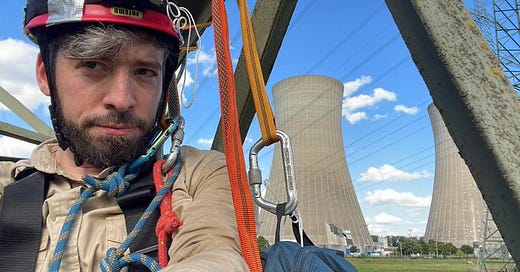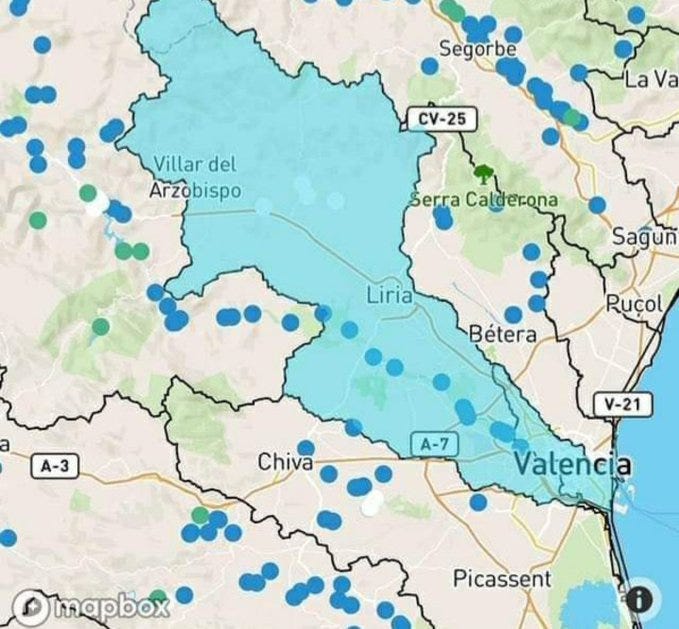Loss of Russian gas has plunged Germany into two-year economic decline
Germany was the manufacturing powerhouse and paymaster of European Union
Globalists shift industry to Asia, while importing low-skilled labour to West
Industry is energy intensive: you cannot cut energy and maintain present society
What will they do with Europe once it's been subjected to degrowth?
The outcome is simple: depopulation, rewilding & anti-speciesism
Related: BRICS Play Many Tunes; West Marches To One - If music be the food of thought (Oct 24, 2024)
The ‘Green energy’ series:
Not Enough Minerals For Green Energy - Putting the D in population (Sep 08, 2022)
UN Terrifies Youth To Push 'Polycrisis' (Sep 24, 2023)
Europe's Parallel Reality: C02 & Degrowth (May 09, 2024)
(2,000 words or 10 minutes of your time.)
Nov 2, 2024
An activist approached the cooling towers near the Bavarian town of Grafenrheinfeld in a desperate act of protest.
He managed only to delay the detonation of the giant vents, almost 500 feet, or 150 meters tall.
It is an act of vandalism being repeated across the West. On a tributary of the River Trent stand the towers of Britain’s last coal-fired power station at Ratcliffe-on-Soar.
After 56 years, its turbines stopped spinning for good as the British government banned the use of coal.
Britain is demolishing its remaining cooling towers at a rate of 10 to 20 a year. They destruction is symbolic. They are not being turned off but knocked down, so that they cannot be used if even in an emergency.
As cooling towers generate a natural updraft, surely they are the ultimate form of renewable energy themselves, so why demolish them?
It is symbolic of our culture's refusal to learn from the past. The Persian wind tower was a well established way to cool buildings before today's reliance on electricity. [1]
The ice house was a common feature to stop it from melting, even in summer, due to its architectural design.
Our cooling towers are less beautiful but follow the same ideas. See this article in Anthropology News. [2]
Inner chi
Energy is the force that gives life - or "inner chi.”
It is the person who urges change without specifics (Barack Obama) or forces behaviours (Larry Fink) who is an external and unwanted drain on that energy. At best a liability, at worst leeching energy.
Disruption challenges the status quo, but sometimes "the state in which things are” has a logic.
Only this January those turbines in Nottingham spun at full speed as Ratcliffe fired up all four of its generating units as an "Arctic blast" froze the country.
The Guardian mentions it as an aside — but there you have the criminal negligence behind the Green energy proposition. The generation capacity of oil, gas, coal and nuclear can be turned up at will. The article contains no reference to what will replace Ratcliffe's 2,000 megawatts, enough to power two million homes when it shut at the end of September.
You are not supposed to make the connection. So The Guardian spins a cheery yarn. [3]
Comments like, "I guess, we have been the scaffolding that the energy system has leaned on to enable renewables to play a bigger part.”
It twists the 1984-5 miners' strike into a heart tug between loyalty to the unions and keeping the lights on. The real choice was between saving the coal industry and de-industrialisation.
Germany decided to persist with the shut down of its nuclear power industry, even after it lost most of its gas supply with the destruction of the Nord Stream pipeline on September 26, 2022.
An amendment to the Atomic Energy Act allowed for a short extension of life, which has now expired.
Construction of the Grafenrheinfeld NPP in the southern state of Bavaria began in 1975 with the plant beginning commercial operations in 1982. It was Germany's oldest nuclear power plant but was closed in 2015 as part of the government's policy to transition away from nuclear power.
Germany has not yet replaced the 1,300 nuclear megawatts that the plant produced.
Mad change
Welcome to the mad, mad world of climate change, Greenery, Russophobia and de-growth.
European gas prices hit the highest in a year, at the wholesale level, after a smoke alarm at Norwegian state producer Equinor led to a temporary shutdown.
It shows the nervousness despite gas storage being 95 per cent full. That's because weather forecasts suggest a cold winter, unlike the mild one of 2023-24.
The U.S. and Azerbaijan are struggling to meet European demand - meaning it all hangs on the wea'vah.
The good news is that Europe already has access to sufficient supplies to meet its gas demand needs past 2040, based on pipelines from Algeria as well as Norway.
This suggests the drive for Liquefied Natural Gas (LNG) may not be necessary in the long term. According to Zero Carbon Analytics LNG contracts will exceed demand by 2027.
How can both be true: a possible gas shortage this winter in Europe, but declining need for LNG?
Well, the clue is in the phrase Zero Carbon; assumptions that Europe won't need LNG are based on declining use of gas, as Europe switches to those renewables - like the solar panels washed away in Valencia.
But is it renewables, or declining demand, known as demand destruction?
Green degrowth
Since the detonation of the Nord Stream gas pipeline in September 2022 businesses have had to cut back. Some are closing operations in Europe and shifting production to the U.S., China and elsewhere.
The State of the Energy Union Report says demand destruction stood at 138 billion cu m between August 2022 and May 2024.
The EU's narrative spinners say it is good that demand for gas is falling because Western Europe is reducing its reliance on Russian gas, while going Green.
Russia supplied 45 per cent of Europe's gas in 2019. That was down to 16 per cent by the start of this year. It is likely to fall further as Ukraine's agreement to transit Russian gas expires at the end of this year. [4]
Supercooling gas and storing it on ships — or liquefied natural gas (LNG) — tends to come from places with lower upstream (initial) costs, and proponents reject the claim that it is wildly more expensive than pipeline gas. On the other hand, gas is already 1000 times less energy dense by volume than crude oil. So transport takes up a lot of the cost.
Don't forget that in January 2024 climate activists pressured the Biden regime to halt the construction of LNG export terminals, though it was overturned by the courts. [5]
Madness: another example. The European Commission under gauleiter Ursula von der Leyen wants to replace Russian gas with Azerbaijan's, but the latter lacks the capacity to meet Europe's needs. So it is proposing a swap deal with Russia to fill its pipes.
In other words Europe would still buy Russian gas, but via a contract with the Azeris.
It has a certain logic not half as crazy as shutting down nuclear and coal-fired power plants before wind, solar and renewables are ready to take up the slack.
In the 1960s and 70s long-distance pipelines were built - some of us would say life was better back then; does this explain why.
The Baltic Nord Stream was completed in the 2010s. Despite the war, Ukraine has continued to transit Russian and Kazakh oil through the Druzhba, or friendship, pipeline across 4,000 kilometes to the former Soviet client states of Eastern Europe.
It’s a gas
Germany faces the slowest growth this year, out of 38-member of the Organisation for Economic Co-operation and Development (OECD) — except, that is, for Britain. Its economy has contracted for two years since Nord Stream was detonated.
The three main reasons, according to Harvard International Review are the loss of cheap Russian, gas, closing its remaining nuclear power plants, and the slow transition to - or failure so far of renewable energy.
Keep reading with a 7-day free trial
Subscribe to Moneycircus to keep reading this post and get 7 days of free access to the full post archives.




